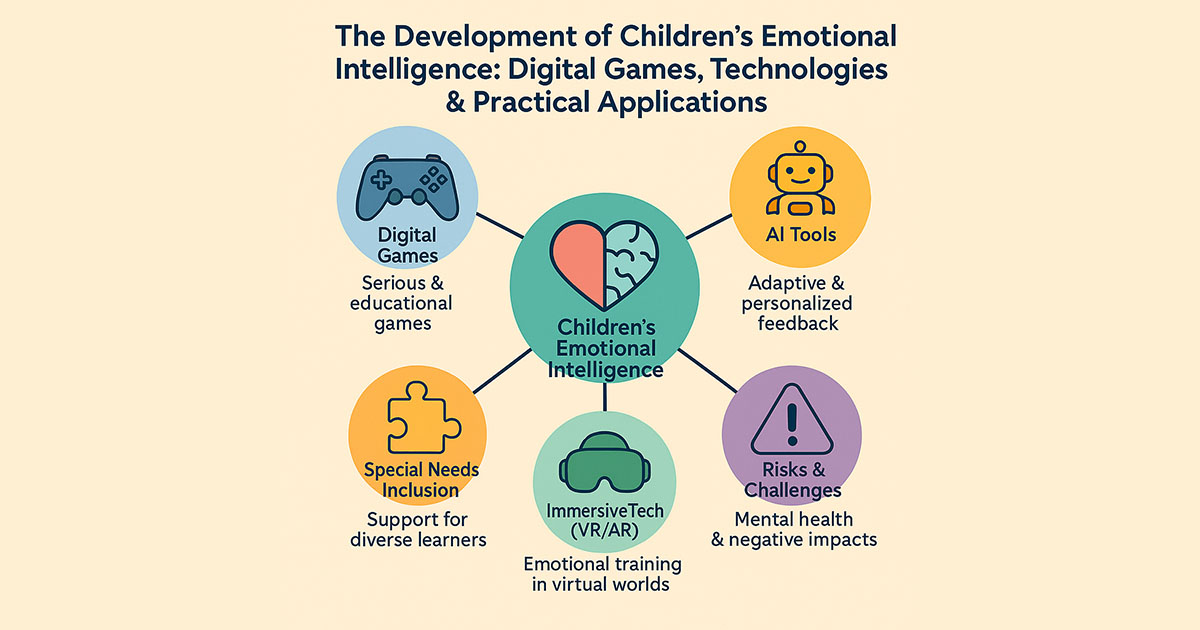The Development of Children’s Emotional Intelligence: Digital Games, Technologies and Practical Applications
A special issue of Journal of Intelligence (ISSN 2079-3200). This special issue belongs to the section "Social and Emotional Intelligence".
Deadline for manuscript submissions: 25 May 2026 | Viewed by 207

Special Issue Editors
Interests: emotional intelligence (general education; special education; social; workplace; psychological; leadership; digital technologies; serious games; social robots; STEM education); emotional skills; teacher education; pedagogy
Special Issues, Collections and Topics in MDPI journals
Interests: emotional intelligence; education; educational research; psychology
Special Issues, Collections and Topics in MDPI journals
Special Issue Information
Dear Colleagues,
The concept of emotional intelligence (EI) was first introduced in the 1990s, and it highlighted the importance of recognizing, understanding, and managing emotions in oneself and others. EI plays a critical role in children’s emotional and social development, influencing their ability to manage emotions, build relationships, and cope with challenges. As we navigate the digital age, innovative tools such as digital games and advanced technologies have emerged as effective mediums to foster EI in children. Research in this field has also been centered on how these tools can be adapted to diverse populations, including children with special emotional or developmental needs, with the aim of making digital emotional intelligence development more inclusive.
Various technological interventions, including serious games, AI-driven emotional learning environments, immersive technologies, social robots, and educational apps, have broadened the scope of how emotional intelligence can be nurtured. These tools provide interactive, personalized, and gamified experiences that help children understand and manage emotions in a dynamic and engaging way. The integration of such technologies in educational and therapeutic contexts has led to a growing body of research exploring their effectiveness, challenges, and ethical considerations.
This Special Issue seeks to explore how digital games, AI-driven tools, and other technological applications can enhance children’s emotional intelligence development, addressing both theoretical and practical approaches. Our goal is to bring together a collection of studies that provide insights into the practical applications of these technologies, while also critically examining their limitations and potential risks. In addition to addressing the positive benefits of emotional intelligence in digital games and related technologies, we also welcome contributions that investigate the potential negative impacts of certain digital games on mental health and emotional intelligence. This dual perspective will allow for a more comprehensive understanding of the role of digital technologies in shaping emotional development.
The scope of this Issue will cover a wide range of topics, including, but not limited to, the design of emotional-intelligence-focused digital games, the role of AI and machine learning in emotional feedback systems, the use of virtual reality (VR) for emotional training, and case studies of digital interventions in educational or therapeutic settings. We encourage submissions that provide both theoretical frameworks and empirical data, offering a comprehensive view of the current state and future potential of this growing field. We also encourage interdisciplinary submissions from researchers in fields such as psychology, education, game design, and computer science.
Dr. Chara Papoutsi
Dr. Eider Goñi-Palacios
Guest Editors
Manuscript Submission Information
Manuscripts should be submitted online at www.mdpi.com by registering and logging in to this website. Once you are registered, click here to go to the submission form. Manuscripts can be submitted until the deadline. All submissions that pass pre-check are peer-reviewed. Accepted papers will be published continuously in the journal (as soon as accepted) and will be listed together on the special issue website. Research articles, review articles as well as short communications are invited. For planned papers, a title and short abstract (about 250 words) can be sent to the Editorial Office for assessment.
Submitted manuscripts should not have been published previously, nor be under consideration for publication elsewhere (except conference proceedings papers). All manuscripts are thoroughly refereed through a double-blind peer-review process. A guide for authors and other relevant information for submission of manuscripts is available on the Instructions for Authors page. Journal of Intelligence is an international peer-reviewed open access monthly journal published by MDPI.
Please visit the Instructions for Authors page before submitting a manuscript. The Article Processing Charge (APC) for publication in this open access journal is 2600 CHF (Swiss Francs). Submitted papers should be well formatted and use good English. Authors may use MDPI's English editing service prior to publication or during author revisions.
Keywords
- emotional intelligence (EI)
- emotional development
- digital games and gamification
- digital interventions for social–emotional learning (SEL)
- artificial emotional intelligence (AEI)
- virtual reality (VR) and augmented reality (AR)
- social robots
- mobile applications
- interactive learning environments
- adaptive learning systems
- emotion recognition
- affective computing
- mental health
- ethical and practical applications in digital emotional learning
Benefits of Publishing in a Special Issue
- Ease of navigation: Grouping papers by topic helps scholars navigate broad scope journals more efficiently.
- Greater discoverability: Special Issues support the reach and impact of scientific research. Articles in Special Issues are more discoverable and cited more frequently.
- Expansion of research network: Special Issues facilitate connections among authors, fostering scientific collaborations.
- External promotion: Articles in Special Issues are often promoted through the journal's social media, increasing their visibility.
- Reprint: MDPI Books provides the opportunity to republish successful Special Issues in book format, both online and in print.
Further information on MDPI's Special Issue policies can be found here.







